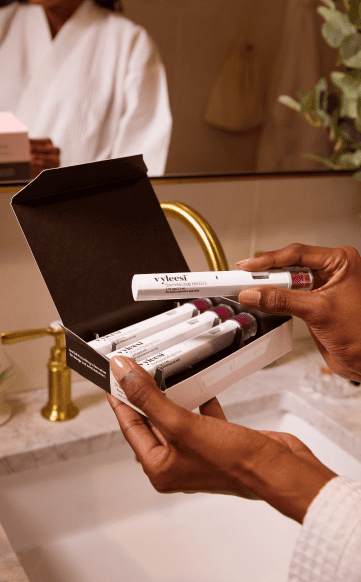What is HSDD?
Hypoactive—“hypo” meaning low—Sexual Desire Disorder is an ongoing and frustrating lack of interest in sex, not to be confused with ability. Women with HSDD still have sex; it’s just not the same.

HSDD is common.
In fact, approximately 1 in 10 women in the US experience it.
Affecting millions of women—mothers, girlfriends, and even teenagers—but most women haven’t heard of HSDD.
What causes HSDD?
From vivid fantasies to thudding heartbeats, the brain—especially amongst women—is responsible for sexual desire. Meaning if you experience HSDD, you and your relationship are not to blame. What it could be is an imbalance in neurotransmitter (chemical messengers) activity in the brain that causes low sexual desire.




Vyleesi is for women with low libido associated with HSDD
Vyleesi is for women who have not gone through menopause, who have not had problems with low sexual desire in the past, and who have low sexual desire no matter the type of sexual activity, the situation, or the sexual partner.
Do not use Vyleesi if you have:
• high blood pressure that is not controlled (uncontrolled hypertension)
• known heart (cardiovascular) disease
Here’s how HSDD may be affecting your overall sexual wellness
Negative body image
No one can make you feel as sexy as you can make yourself feel. HSDD can impact the way you see yourself, making you less excited to put on that favorite bra and appreciate the beauty that’s right in front of you.
Avoiding intimacy
Sexual desire strengthens the physical and emotional connection of relationships. Disinterest in the romance you used to crave can leave you feeling disconnected from your partner.
Low self-esteem
For many women who experience HSDD, feeling like there is something wrong with you or like something’s missing can really impact your confidence.
How do you know if you have HSDD?
Because HSDD is a medical condition, you would need to consult your healthcare professional, either in person or through telemedicine. There is no single lab test to confirm the diagnosis of HSDD.
A validated tool for diagnosing HSDD is the
Decreased Sexual Desire Screener (DSDS),
a short series of questions that focus on the symptoms of HSDD.
HSDD Symptom Checker
If you’re not sure if you’re ready to talk to a doctor about your low sexual desire, checking if your symptoms point to HSDD can help you decide.


